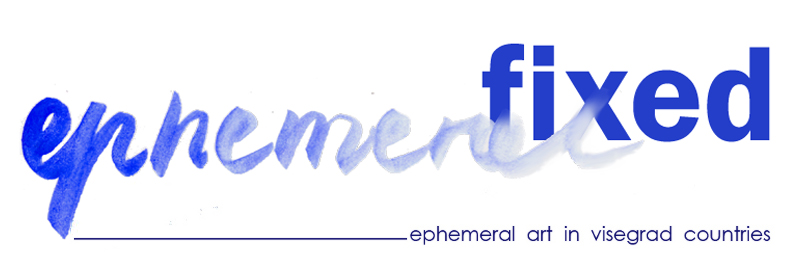




It happened
The representatives of ARIs from the 4 countries participating in the Project presented
the documentation of chosen projects realized by their Galleries:
Galerie Jama 10 (former Galerie Eingang), Ostrava, Czech
Malamut Festival, Ostrava, Czech
Kassák Centre of Intermedia Creativity (K2IC), Nové Zámky, Slovakia
Magyar Muhely, Budapest, Hungary
Monar Galéria, Monor, Hungary
Galeria Wschodnia, Lodz, Poland
Galeria Wymiany, Lodz, Poland
Art and Documentation Festival, Lodz, Poland
Interakcje, Piotrków Trybunalski, Poland
On Saturday March 17th, at 2 pm, the presentations of ARIs -
Artist Run Initiatives began. This part was entitled "It happened"
and it aimed at presenting the history of independent initiatives that
have been not institutionalised in Visegrad countries.
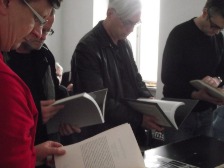
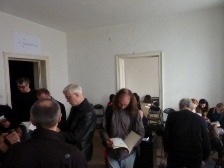
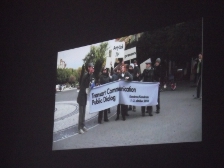
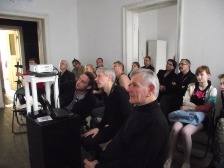
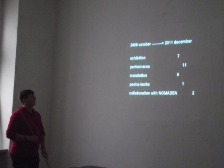
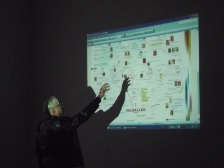
The presentations were started by Adam Klimczak who presented the history of the Wschodnia Gallery
that is situated in his studio. From the very beginning it has been run by Adam
Klimczak and Jerzy Grzegorski and is sponsored by them. Its programme focuses on
alternative and experimental projects, and also presenting art in unconventional places
- shops, factories, public space. For 10 years it was also a place in which the artists
were awarding other artists with the Katarzyna Kobro award, funded by brothers Dariusz
and Krzysztof Bienkowski. The Gallery regularly presented works by artists from around the world.
Jozef Robakowski presented the activities of the Exchange Gallery that
he established in 1978 with the co-operation of Malgorzata Potocka.
It contains an enormous collection of video, films, photographs,
leaflets, visual poetry and artists' documentation. The collection
is based on the exchange of artworks between Polish and foreign artists.
In the collection there are works by Henryk Stazewski, Dick Higgins, Richard Nonas, and the Lodz Kaliska Group.
The Gallery also publishes art books and organises exhibitions and symposiums.
Izabela Lejk currently co-operates with the Gallery.
It is a rule that the Gallery does not apply for any public grants
or institutional support. It is situated in a private apartment
in one of the tall buildings in Lodz called the "Manhattan" estate and
it is possible to view the collection by appointment.
Lukasz Guzek presented the activities of the Art
and Documentation Association that has gathered together artists and art
theoreticians since 2009. It has currently organised four Art and Documentation festivals
(2009-2012) and published five issues of the journal Art and Documentation, that
includes scholarly articles mainly devoted to ephemeral art, plus the history of
contemporary art, artists' manifestoes and documentation of the non-commercial
gallery movement in Poland from the 70s till present.
Piotr Gajda and Gordian Piec showed documentation from the festival Interakcje,
which has been organised for 13 years in Piotrkow Trybunalski.
The first festival took place in the Europa Restaurant, then an "exclusive place"
in the center of the town and the participating artists were from Poland and France,
thanks to the contacts of artist Ryszard Piegza who has lived in France for many years.
The idea for the presentation of action art in Piotrkow Trybunalski,
where the public was used to more traditional art forms was a bit unconventional,
but successful. The Interakcje festival has a large and dedicated audience.
The festival's patron is the performance artist and art theoretician Jan Swidzinski.
For a few years now the artists have had a gallery space at their disposal,
where the festival regularly takes place.
Balint Sombati showed the activities of the Magyar Muhely Foundation from Budapest,
that is also the publisher of the Magyar Muhely magazine,
publishing texts on art and literature and includes examples of visual poetry.
The journal has a long tradition. It emerged in 1962 in Paris, as an initiative
of Tibor Papp (a Hungarian poet, artist, writer and translator).
The Magyar Muhely Foundation, apart from publishing the journal and
other publications about contemporary art, also runs a gallery with regular exhibitions.
Jozsef Juhasz showed the artistic program of the Kassak Centre for Intermedia Creativity
in Nove Zamky (Slovakia) which is very close to the Hungarian border.
The name of the gallery comes from the name of Lajos Kassak -
a Hungarian poet, writer, painter and architect. The basic
aim of the Kassak Centre is coordinating the cooperation between
the organisations and artists that focus on intermedia art acting outside of state structures
(museums, state galleries etc.). The Kassak Centre organises the "Transart Communication public dialog"
festival, that focuses specifically on the border region between Slovakia and Hungary and
the co-existence of Slovaks and Hungarians in contemporary times.
Imre Denes prepared a presentation about the Monar Gallery that is
located in a small town near Budapest called Monor. Its aim is to
present contemporary art to a small town community. The Gallery has existed
since 2009 and since then has organised quite a few exhibitions,
performance art events and installation art shows.
The presentations were concluded by Jiri Suruvka who showed the activities
of the Jama Michal Gallery in Ostrava and the Malamut Festival, devoted to performance art.
The first festival was organised in Ostrava by Petr Lisacek and Jiri Suruvka.
It was later continued in Prague then came back to Ostrava in 2007
under the former name Malamut. The name of the festival comes from the breed
of dog that looks almost like a wolf, but has a very mild and friendly character.
Unfortunately the city authorities in Ostrava are not too friendly
towards the festival. The actions of artists in the city space are too
unconventional for the authorities and the events are not sponsored by the town.
The organisers of "Ephemeral Fixed. Ephemeral art - history documented"
hope that the event will be the beginning of co-operation between artists
and art critics from Central Europe and that due to publication and translation
of the texts into various languages it will be possible to popularise and deepen
the knowledge of ephemeral art and the role of the non-commercial gallery movement
among researchers. The project was supported by the Visegrad Fund and organised
with the co-operation of partners: The Magyar Muhely Foundation from Hungary,
The Kassak Centre of Intermedia Creativity from Slovakia and the Jama
Michal Gallery from the Czech Republic.
a report prepared by Lodz-art
translation: Malgorzata Kazmierczak, Anne Seagrave
photos: Norbert Trzeciak, Jerzy Grzegorski, Adam Klimczak, Pawel Hartman, Malgorzata Kruszyniak, Anka Lesniak












